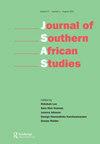Cooking, the Crisis and Cuisines: Household Economies and Food Politics in Harare’s High-Density Suburbs, 1997–2020
IF 0.7
4区 社会学
Q2 AREA STUDIES
引用次数: 0
Abstract
This article examines changing attitudes to afternoon and evening meals during the Zimbabwean crisis between 1997 and 2020. It uses household food economics in Harare’s high-density suburbs as an entry point into the historiography of the Zimbabwean crisis. By focusing on the management of household economics, the article analyses the affordability, typologies and naming of some meals or relishes that were eaten during the crisis period. It examines the vernacular concepts of tsaona meals that came to dominate afternoon and evening meals. It further analyses the ZANU(PF) government’s authoritarian vegetarianism – in which it took a pseudo-decolonial stance as it attempted to re-teach Zimbabwean palates and bowels to consume traditional small grains and vegetables in the context of food shortages and the crisis. Overall, the article provides a sensorial history of meals in Harare’s high-density suburbs during the Zimbabwean crisis.烹饪、危机和美食:1997-2020年哈拉雷高密度郊区的家庭经济和食品政治
本文考察了1997年至2020年津巴布韦危机期间人们对下午和晚餐态度的变化。它以哈拉雷高密度郊区的家庭食品经济学为切入点,研究津巴布韦危机的历史。本文以家庭经济管理为重点,分析了危机时期人们所吃的一些餐点的可负担性、类型和命名。它考察了在下午和晚上占主导地位的炒饭的本土概念。它进一步分析了非洲民族联盟(爱国阵线)政府的专制素食主义——在粮食短缺和危机的背景下,它采取了一种伪非殖民化的立场,试图重新教导津巴布韦人的口味和肠道食用传统的小谷物和蔬菜。总的来说,这篇文章提供了津巴布韦危机期间哈拉雷高密度郊区饮食的感官历史。
本文章由计算机程序翻译,如有差异,请以英文原文为准。
求助全文
约1分钟内获得全文
求助全文
来源期刊

Journal of Southern African Studies
AREA STUDIES-
CiteScore
1.40
自引率
0.00%
发文量
73
期刊介绍:
The Journal of Southern African Studies is an international publication for work of high academic quality on issues of interest and concern in the region of Southern Africa. It aims at generating fresh scholarly enquiry and rigorous exposition in the many different disciplines of the social sciences and humanities, and periodically organises and supports conferences to this end, sometimes in the region. It seeks to encourage inter-disciplinary analysis, strong comparative perspectives and research that reflects new theoretical or methodological approaches. An active advisory board and an editor based in the region demonstrate our close ties with scholars there and our commitment to promoting research in the region.
 求助内容:
求助内容: 应助结果提醒方式:
应助结果提醒方式:


